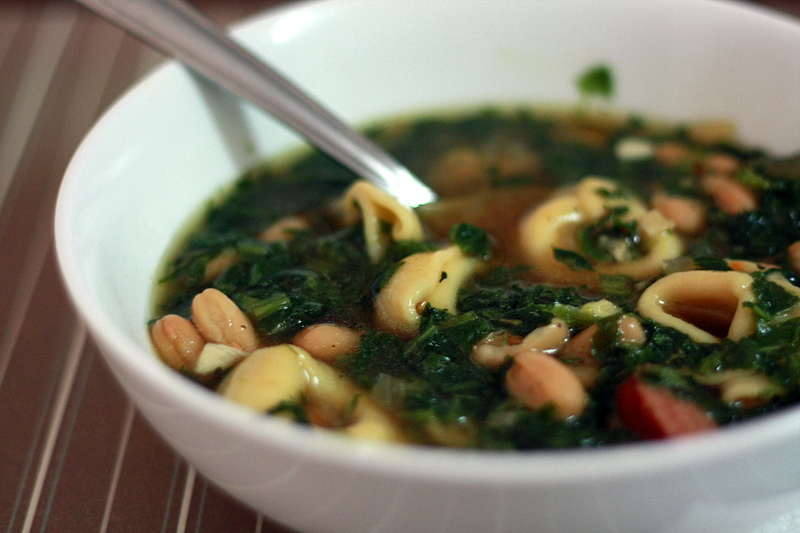
I have been in a bit of a funk lately when it comes to making dinner. When trying to set up my weekly menus nothing in my "to make" pile or "already made" stash sounds good. I seem to be gravitating more towards the baking and snacking items as of late rather than the oh, important thing called dinner. While cleaning out my Foodbuzz inbox late Sunday night, I came across a recipe for Tortellini and Kielbasa soup. Soup, now that was something I could go for. Tortellini and kielbasa? Yes please.
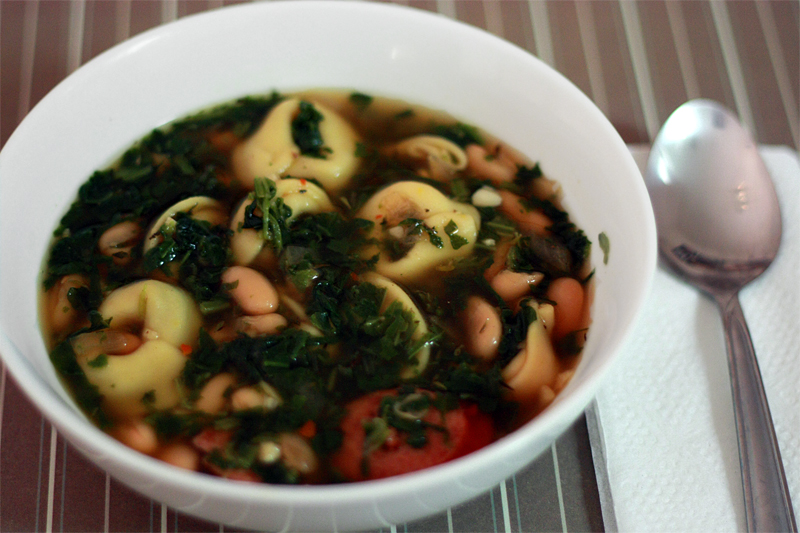
Tortellini, Kielbasa, and Spinach Soup
Adapted from: All Day I Dream About Food
Adapted from: All Day I Dream About Food
2 tablespoons olive oil
1 pound kielbasa sausage, sliced on the bias about 1/4" thick
1 cup onion, diced
4 garlic cloves, minced
1 1/2 teaspoons dried thyme
1/2 teaspoon red pepper flakes
10 cups fat-free, low-sodium chicken broth
1 (10 ounce) package frozen spinach
1 (15.5 ounce) can cannellini beans (white kidney beans)
1 (16 ounce) package frozen cheese tortellini
1/2 teaspoon salt
1/4 teaspoon pepper
1/4 cup parmesan cheese
Remove tortellini from freezer and set on counter-top to thaw while preparing the rest of the soup.
In a large stockpot, heat oil in over medium-high heat. Add kielbasa and red pepper flakes. Saute until browned, about 10 minutes, stirring frequently. Add onion and cook until soft and translucent, about 5 minutes. Stir in garlic and thyme, cooking until fragrant, about 30 seconds.
Increase heat to high, add broth and bring to a boil. Stir in cannellini and spinach and reduce heat to medium-low. Simmer 4-5 minutes or until spinach has completely separated as is heated through.
Add tortellini to broth mixture. Simmer until tender but firm, about 6 minutes. Add salt and pepper to taste. Serve with a sprinkle of cheese on top.
Serves: 10 (422g servings)
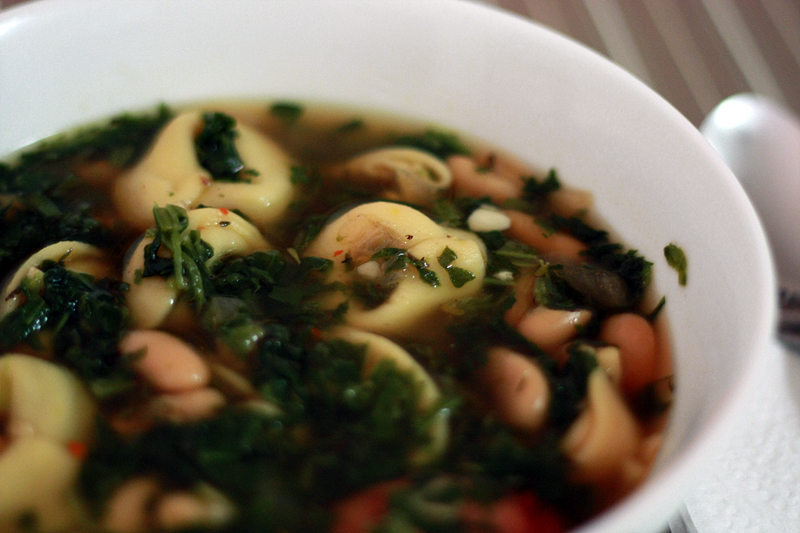
I think I have eaten so much of this soup (willingly, mind you) that I should be renamed Popeye. But don't let the spinach and chicken broth fool you, the tortellini, beans, and kielbasa make for one hearty soup.
And this soup isn't just for those looking for a healthy dinner (which it very much is). I'm pretty sure I heard "Is it done yet? Is it done yet? It smells amazing." every 5 minutes from Adam, who then promptly took down two bowls in one sitting as soon as it was done. So even the manly carnivore is a fan of this soup. That's a win-win situation for me. Move this recipe to the keeper pile.
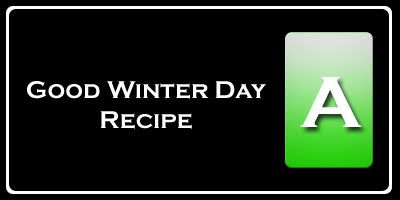
| Nutrition Facts | |
| Amount per serving | |
| Calories 443 | Calories from fat 132 |
| % Daily Value | |
| Total Fat 14.6g | 23% |
| Saturated Fat 3.7g | 19% |
| Trans Fat 0.0g | |
| Cholesterol 43mg | 14% |
| Sodium 1323mg | 55% |
| Total Carbs 54.5g | 18% |
| Dietary Fiber 11.9g | 48% |
| Sugars 1.6g | |
| Protein 24.8g | |
| Vitamin A 54% | Vitamin C 30% |
| Calcium 13% | Iron 29% |
Get Up and Move Challenge Day 17: What is the correct amount of carbohydrates, proteins, and fats I should be eating?
 Yesterday we touched on finding out how many calories you should be eating per day. But what should those calories consist of? While you can pretty much consume anything adding up to that caloric value and not gain weight, it doesn't necessarily mean you are eating healthy. (Anybody remember the Hollywood Cookie Diet? Or the Taco Bell Diet?)
Yesterday we touched on finding out how many calories you should be eating per day. But what should those calories consist of? While you can pretty much consume anything adding up to that caloric value and not gain weight, it doesn't necessarily mean you are eating healthy. (Anybody remember the Hollywood Cookie Diet? Or the Taco Bell Diet?)There are 3 big "macronutrients" which make up the majority of our food, and I'm sure you've heard all 3: carbohydrates, fats, and protein. (There is a 4th, alcohol, but as this is completely empty calories and doesn't have much nutritional value, we will for now, leave this one out.) Of the 3 macronutrients, protein is the only one with a finite amount needed for consumption every day. (Remember those things called essential amino acids?)
I'm sure you've heard of those low-carb high-protein diets, and they've made you stop and think about how much protein you are getting every day. But how much do you really need? 30, 40, 70, 100 grams? There is no hard and fast rule for every single person, hence why there is no Daily Value percentage listed on nutrition labels. The amount of protein you need is specific to your weight and activity level. So how do we figure that out?
Sedentary adults, those who are active less than 30 minutes 3 days of the week only need 0.8 g/kg of protein each day.
Active adults, those who are active for 30 minutes or more 3 days or more of the week at a recreational level (not at a high level of training), need 0.8 - 1.0 g/kg of protein per day.
Endurance athletes, those adults who are training for long distance aerobic races such a 1/2 marathons, sprint triathlons, etc. need 1.2 - 1.4 g/kg of protein per day.
Ultraendurance athletes, those who are training for marathons, ultramarathons, Ironman triathlons, etc., need 1.2 to 2.0 g/kg of protein each day.
Strength athletes, those adults who are training for body building or muscle strength competitions, need 1.6 - 1.7 g/kg of protein per day. [1]
g/kg? What is that? This is the grams of protein per kilograms of body weight you need of protein per day. Remember, to find your weight in kilograms, simply divide your weight by 2.2. Then multiply your weight in kg by the amount of protein you need for your activity level (0.8, 1.0, 1.2, etc).
So a 150 pound sedentary adult would need about 55 grams of protein per day. A 200 pound person? 73 grams. If you fall into a category that has a range, such as an active adult, be honest with yourself and determine how "active" you really are. If you are working out at a moderate-intensity for 30 minutes a day 5 times a week, you would need less protein than those working out at a vigorous-intensity 40 minutes 5 days a week despite falling into the same category.
What about carbohydrates and fats? The exact amount needed each day of the remaining two macronutrients has yet to be completely determined. Various studies all claim different amounts are needed, and some, such as low-carb or low-fat diets propose that you need barely any at all. As there is no definitive answer, and the health-risks for extreme-type diets are not yet determined it is hard to give any clear cut number. However, we can take a look at those people who have been successful not only with weight loss, but with weight maintenance as well. What do I mean by "successful"? Try an average weight loss of 66 pounds maintained over 5.5 years! These are the members of the National Weight Control Registry [2]. Obviously they are doing something right to be so successful at leading a healthier life than they once were.
So what do their eating patterns tell us?
Their diet consists of 55% carbohydrates, 20% protein, and 25% fat [3]. None of this extreme no-carb or no-fat business, just a well rounded, healthy diet.
We have our numbers and percentages, now what?
First, it is important to know that each macronutrient contributes a different amount of calories. 1 gram of protein is 4 calories, 1 gram of carbohydrates is 4 calories, and 1 gram of fat is 9 calories (and if you must know, alcohol is 7 calories/gram). Now, start with the amount of protein you need each day (above). We're going to use an example on this one:
150 pound, 5'4" sedentary female
Calories needed to maintain weight = 1634 kcal
Protein needed = (shown above) 55 grams
55 grams x 4 calories = 220 calories from protein
Carbs desired: 55% of 1634 = 899 calories
899 calories divided by 4 (number of calories per gram of carb) = 225 grams of carbs
Fat desired: 25% of 1634 = 409 calories
409 calories divided by 9 = 45 grams of fat
Now if we add together our total calories of protein, carbs, and fat we only reach 1528. You may also notice that the amount of protein only totals 13% rather than the 20% we were aiming for. This is okay, and one of the problems with determining protein needs by percent of total calories. In the end our example is left with 106 "discretionary" calories to be used by fats, carbs, protein, or alcohol.
Whew! That's a lot of information. Now that you have your eating record from yesterday, you can go through and figure out how much of each macronutrient you are eating, and if you need to eat more or less of one.
What macronutrient (carbohydrate, protein, fat, or alcohol) do you tend to lean towards more than others?
[1] Dunford M and Doyle JA. Nutrition for Sport and Exercise. Belmont, CA: Wadsworth; 2008, pp. 149.
[2] National Weight Control Registry [internet]. [cited 2010 Nov 17]. Available from: http://www.nwcr.ws/default.htm.
[3] Klem ML, Wing RR, McGuire MT, Seagle HM, Hill JO. A descriptive study of individuals successful at long-term maintenance of substantial weight loss. Am J Clin Nutr. 1997;66(2):239-46.

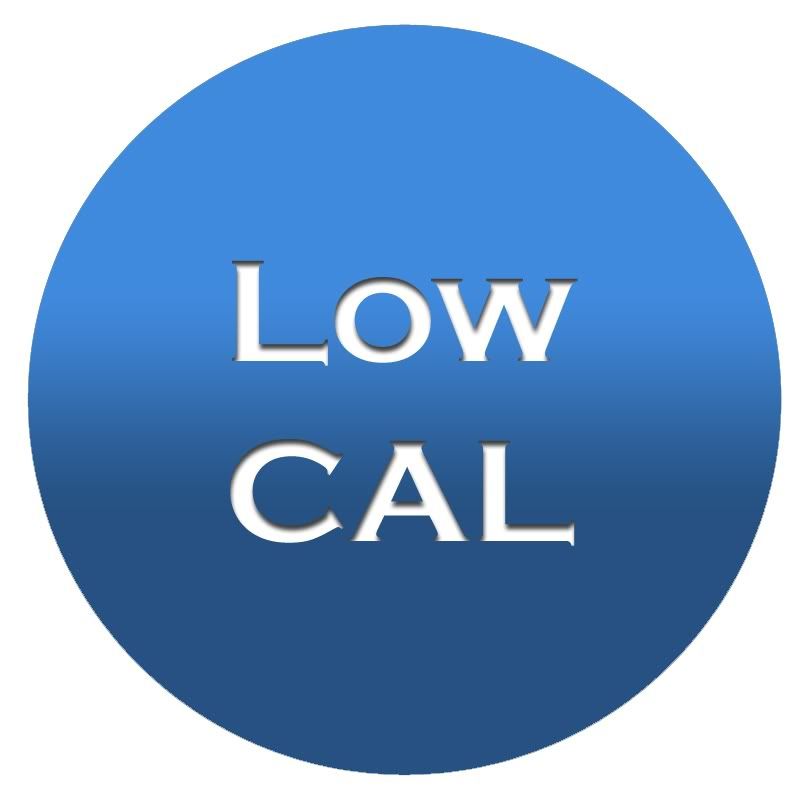
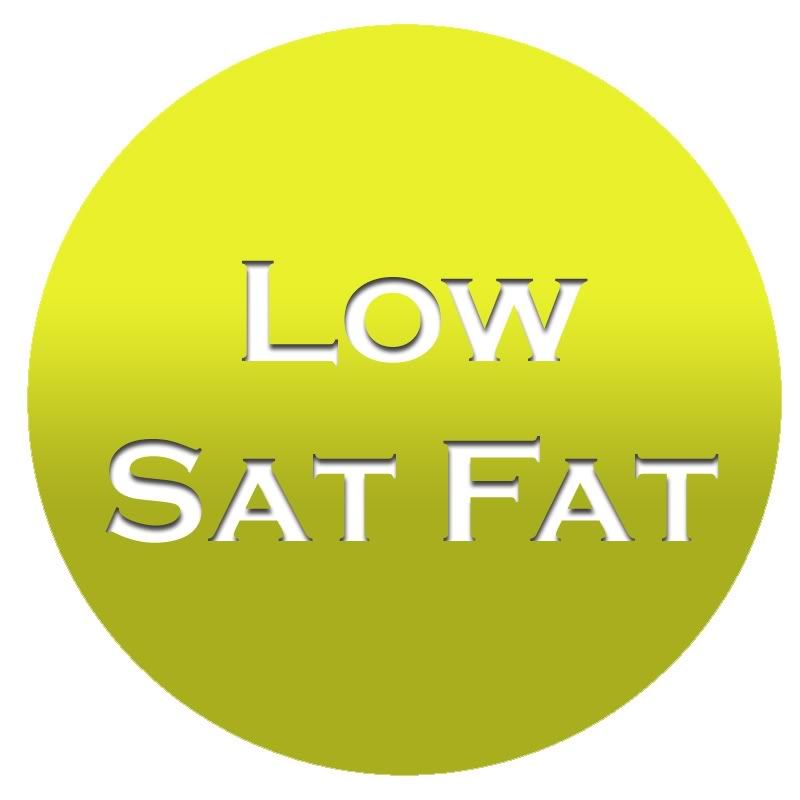
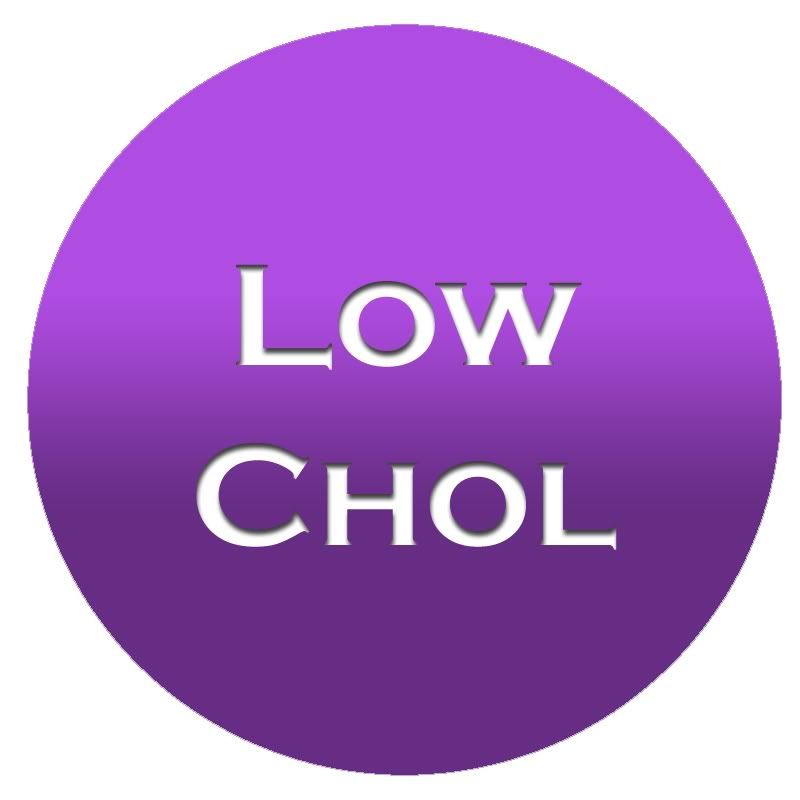
Wow, when I posted that recipe, I never imagined it would be so popular (despite the fact that it is our favourite soup). But it got such an amazing response and several people have made it already! I am so flattered and I hope you found it as good as we do. And that it got you out of the making dinner funk!
ReplyDeleteI will have to try this the next time it's my turn for our Soup Group!!!
ReplyDeleteA wonderful soup!! This one will work for our whole family... thank you!!
ReplyDelete